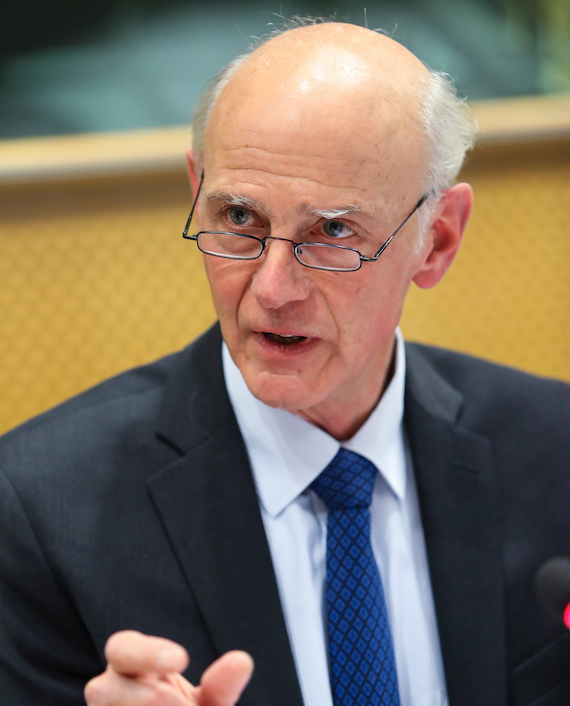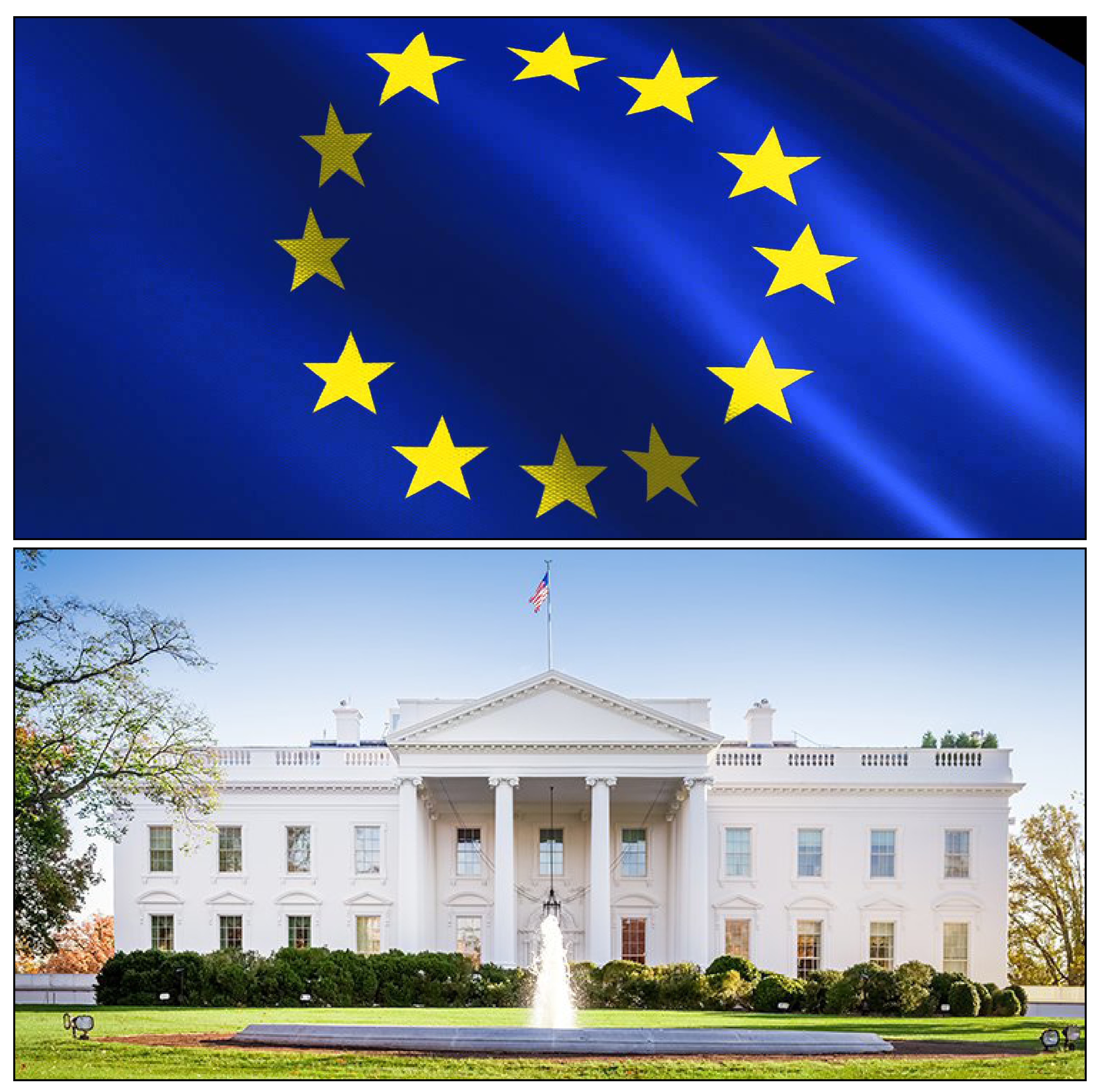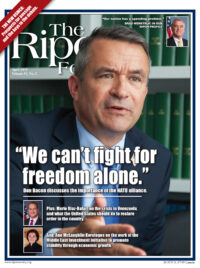
When Chancellor Merkel visited President Bush during the first week of Germany’s six-month presidency of the European Union in January 2007, she proposed a transatlantic free trade agreement (FTA) to strengthen Europe and America’s ability to compete with what she saw, even then, as a rising China.
Washington wasn’t ready: the World Trade Organization (WTO) Doha negotiations were our top trade priority, and the threat from China still seemed distant. The United States and EU instead created the Transatlantic Economic Council, which discussed China over a ministers-only lunch during its first (and most successful) meeting in November 2007, a discussion facilitated when then EU Trade Commissioner Peter Mandelson convinced his colleagues that Europe needed to stop playing the “good cop” with Beijing. Cooperation on China between Washington and Brussels flourished for the remainder of the Bush Administration.
Perhaps ironically, it was a Democrat, President Obama, who resurrected the US-EU FTA idea in his 2013 State of the Union. China’s economic weight loomed larger, and Mr. Obama and his new Trade Representative, Michael Froman, saw the Trans-Pacific Partnership (TPP) and what became the Transatlantic Trade and Investment Partnership (TTIP) as a response. TPP renegotiated NAFTA and opened new FTAs with Japan, New Zealand, Malaysia, and Vietnam; TTIP built on the unique U.S.-EU investment-based relationship (then $5 trillion of two-way foreign direct investment) to strengthen the global competitiveness of American and European firms and workers. Froman brought TPP to signature in October 2015, but TTIP was held back by the priority given TPP, miscues in the early stages of the negotiations, and the Snowden revelations, which helped give more credence to concerns whipped up about American companies allegedly seeking to weaken Europe’s regulatory protections, including through investor-state dispute resolution (ISDS).
Europeans now argue they will only put their “sensitive” agricultural sector into the talks if the US will allow access to its “sensitive” government procurement market. Both are wrong.
European leaders were querulous at President Trump’s decision to withdraw from TPP. They welcomed the “own-goal” that reinvigorated Canada, Japan and Mexico’s interest in concluding FTAs with the EU, but wondered that China should be the other beneficiary.
They were astonished when the Administration then used national security concerns to levy punishing tariffs on imports of steel and aluminum. While EU exports were relatively modest at $6 billion, and cognoscenti understood that the Administration’s trade policy leaders came from a steel industry that had long felt beleaguered (especially after the WTO struck down President Bush’s steel “safeguard” action in 2003), they wondered how hurting America’s allies helped its national security, and knew they had to respond with their own tariffs and in the WTO against a step any other country could use to justify closing its markets.

But they were aghast when the Administration then cited the same (spurious) grounds to possibly justify an attack on Europe’s $60 billion of autos and auto-parts exports to America. The move would only affect U.S. allies in America, Europe and Asia; it undermined huge U.S. investments by firms like BMW and Toyota; U.S. industry opposed it; and autos are even further removed from national security. Indeed, Europeans could only see this as a naked attempt to create negotiating leverage in the form of a cudgel… A cudgel that would beat not only them, but also destroy the burgeoning U.S.-EU-Japan cooperation against a Chinese economic threat that is no longer distant, but immediate. This cooperation, instigated largely by Tokyo, had led to a statement on the need for a Level Playing Field on the margins of the December 2017 WTO Ministerial, which was further elaborated in trilateral meetings in Brussels in March 2018, in Paris at the OECD Ministerial later in May, and in Washington in January 2019.
EU Commission President Jean-Claude Juncker travelled to Washington in July to ward off the blow by refocusing Washington on the importance of U.S.-EU collaboration, and to lay the grounds for renewed trade talks. But when the two sides eventually laid their cards on the table in January, with the US Trade Representative’s (USTR) negotiating objectives and the Commission’s request for a negotiating mandate from the EU member states, they were playing different games. USTR effectively resurrected the full TTIP agenda (suggesting it could be done in stages); the EU remained steadfast to the letter of the Juncker-Trump statement, which referred only to industrial goods.
Stung by the steel duties and the threat on autos, Europeans now argue they will only put their “sensitive” agricultural sector into the talks if the US will allow access to its “sensitive” government procurement market. Both are wrong. And both are short-sighted.
The EU, by its own account, has been the world’s largest agri-foods exporter for the past three years. It has run an agri-foods surplus since 2010; its exports to America (its largest market) are double its imports. This is no longer an “infant industry” to be shielded by tariffs. But the Administration’s tactics are also wrong; threats against an ally dealing with Brexit and upcoming elections were always likely to be met with a defensive crouch.
But the Administration’s tactics are also wrong; threats against an ally dealing with Brexit and upcoming elections were always likely to be met with a defensive crouch.
Europe now waits for the auto shoe to drop. Commerce has delivered its national security assessment to the President. It’s not public, but EU leaders expect the worst, and know they will have no choice but to respond as they did on steel. Even though the EU’s planned retaliation at €20 billion is only one-third the level of the possible US action, combined with the steel saga, $100 billion in transatlantic trade will be impaired.
Meanwhile, Beijing – and Moscow – are delighted.
A reset is needed. A TTIP that helped heal the Brexit wound by including the UK (and perhaps Canada and Mexico) would be ideal, but won’t happen. But the two sides can agree to reframe their approach. Rather than the European approach of drawing the line by sector, they can do so by function. Include agriculture in a market-access only trade agreement, accepting that both parties will retain some duty and quota protections on say three percent of sensitive tariff lines, and knowing this won’t resolve America’s legitimate concerns about EU import restrictions, which are largely regulatory.
That said, at the same time the two sides need to learn the political lesson of TTIP and keep specific food safety (and other regulatory) issues out of the trade talks. Have regulators, overseen by politicians, address these separately, cognizant that neither side can afford to be seen as “lowering” food safety standards. The EU has numerous “sanitary and phyto-sanitary” issues with the US, just as the US has with Europe. Not all reflect concerns about safety; many reflect instead bureaucratic inertia. Some–even in the contentious biotech area–can be resolved, especially if a constructive atmosphere on trade talks replaces the threats and bickering we see today.
If the US and EU can resurrect at least the spirit of TTIP, it could inject new purpose into the transatlantic partnership, and help the US and the EU refocus on the problem Mrs. Merkel rightly highlighted a decade ago.
Peter Chase is a Senior Fellow of the German Marshall Fund of the United States, based in Brussels, who served for 30 years as a U.S. diplomat (including tours at the U.S. Mission to the EU, in London, at USTR, and as head of the Office of European and Regional Affairs 2004-07) and six representing the U.S. Chamber of Commerce in Brussels before joining GMF full time in 2016.




